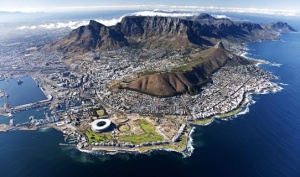Norman Peires On the Evolution of Cape Town

As South Africa’s oldest city and arguably its most popular international tourist destination, Cape Town continues to be one of the big travel success stories of the past twenty years. Popular with all demographics, from families to fine diners, and backpackers to honeymooners, it seems there is no one this cosmopolitan city can’t charm. “Welcome to Cape Town. There’s always something on!” boasts the tourist website. But it wasn’t always this way.
South African businessman and luxury travel business owner, Norman Peires, has seen the city’s metamorphosis from a local summer spot to bonafide global destination. “As a child growing up in Cape Town, it was always a place that people from Johannesburg would visit - the market was purely domestic. Visitors would come in the first week in December and leave by mid January. And that was the season, even though the weather was lovely all the way from mid-September to April. We didn’t mind - we’d go to the beach and have it to ourselves once the visitors had gone.
“Post-Apartheid, Cape Town began to come into its own, although it took time for the city to take the shape that visitors find it today. The Waterfront, for example, was reclaimed and developed from the docks over many years, turning it into the big draw that it is today. Now the secret is out. The international markets know what we knew all along - that the food is great, the sand is fine, the False Bay coast is warm enough to swim and the natural geography of the area is stunning. In addition, the Cape Winelands are a day trip away and the game reserves a few hours drive, so we’ve seen an upswing in multi-centre holidays - combining game drives with the Garden Route. Plus with no jet lag involved and reliable heat during the Continent’s winter season, it is little wonder the city continues to perform so strongly with the European market.”
According to Federated Hospitality Association of South Africa Cape members, Holland, Germany and the UK continue to dominate reservations in the Western Cape - booking alongside a growing, and now year-round, domestic market. And last year Cape Town’s rejuvenated tourism industry was rewarded when it swept up awards at the 2014 World Travel Awards, crowned Africa’s Leading Destination and Africa’s Leading Cruise Port. This was followed by a nomination for the 2014 World Design Capital, beating off stiff competition from rival cities such as Bilbao.
“From being a place that only woke up for a few weeks of the year, Cape Town has evolved into a sophisticated destination,” says Peires. “The cultural and political diversity of the city is matched and complimented by the international influences that come with a thriving tourist industry.”
It’s a measure of the determination and rich potential of Cape Town that even with its economic and social challenges, the city continues to draw positive plaudits from travellers and from the wider travel industry itself. Big events such as the FIFA World Cup in 2010 shone the spotlight on the city and brought pride and infrastructure, while an ongoing emphasis on authentic travel experience and eco-tourism has become woven into the framework for a forward-looking and responsible tourist industry.
Indeed, the Etisphere Institute, a global leader in advancing standards of ethical business practices, recently singled out Cape Town as “one of 10 cities in the world most likely to become centres of sustainability by 2020”, and it has also received a nod from the Ethical Traveler as one of the “Top Ten Ethical Destinations in the World”.
“Responsible Tourism is a big part of our tourism focus and we are constantly educating the tourism sector about the choices they can help their guests make. In particular, we encourage visitors to consider tour operators that are invested and respected in the communities they bring tours to,” says Enver Duminy, CEO of Cape Town Tourism. “Capetonians are also very aware and protective of the natural assets that surround them. As the demand for green and responsible tourism grows so does the offering; Cape Town was in fact the first city to develop a Responsible Tourism charter.”
With such a wealth of natural resources, positive energy and a focus firmly on a sustainable future, the Mother City looks set to continue to be at the vanguard of African tourism for 2015 and beyond.

